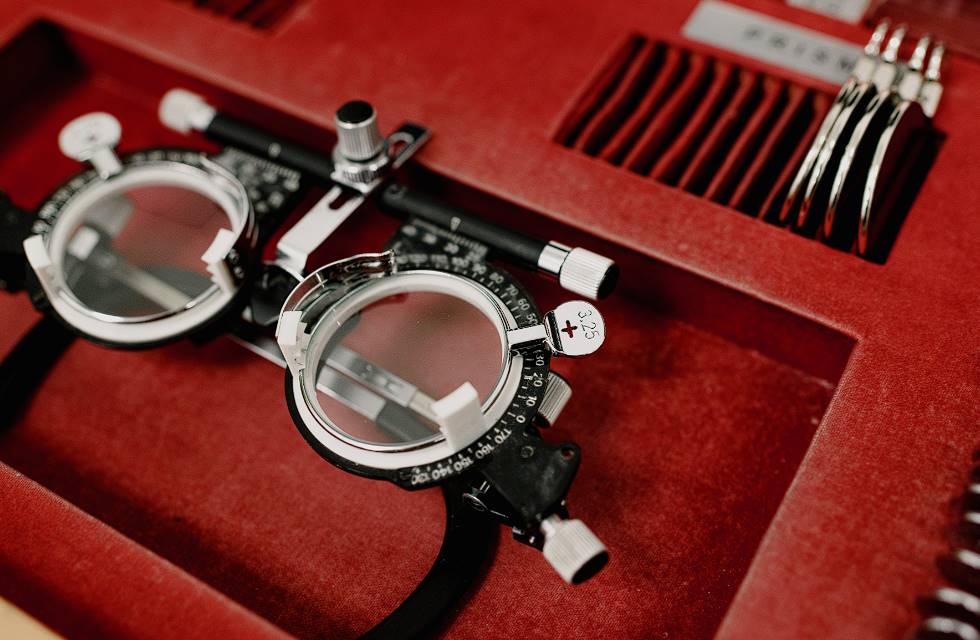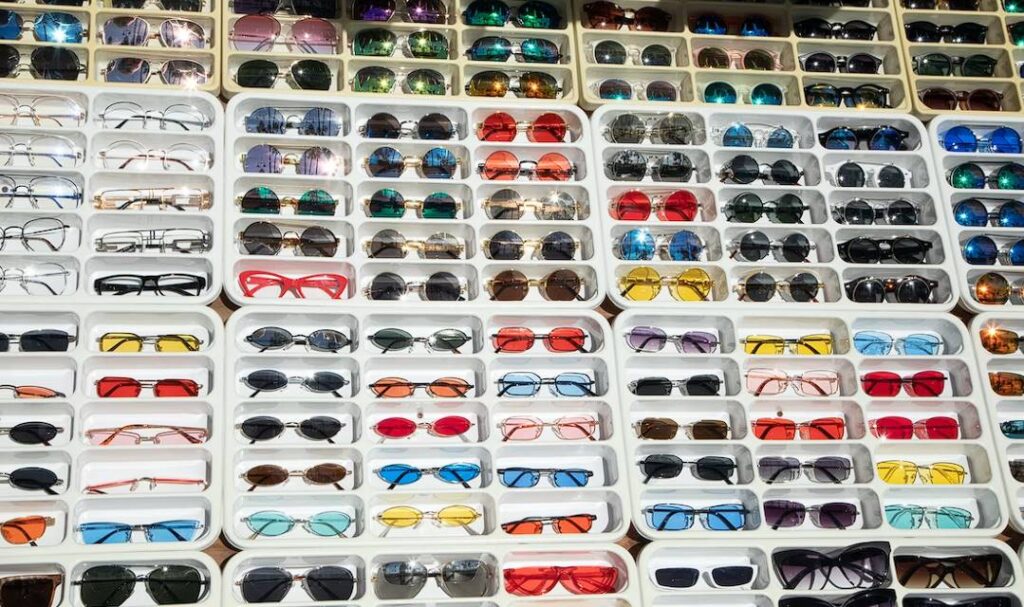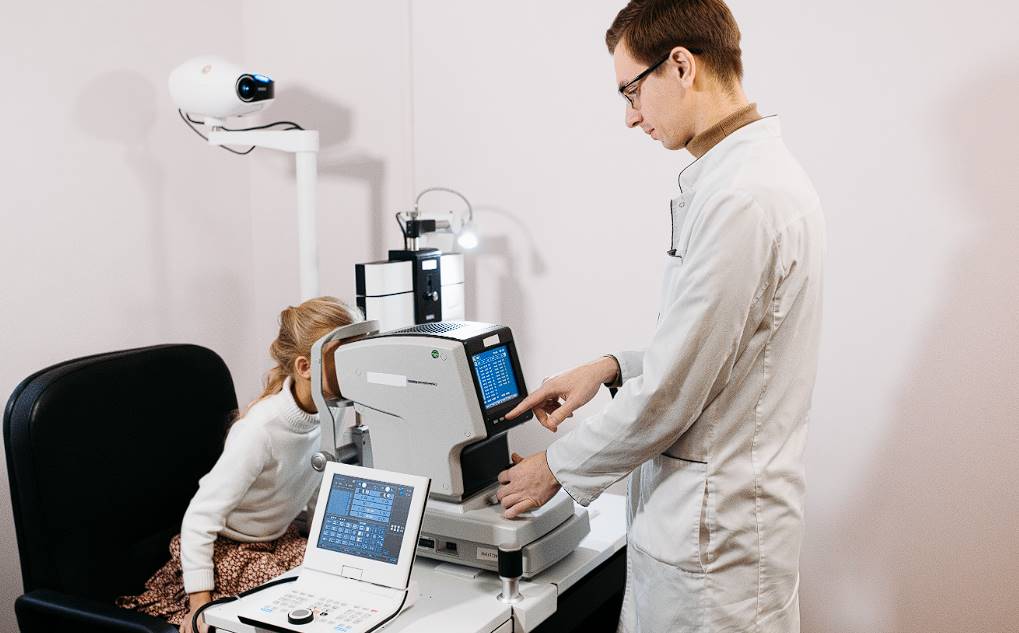Eyeglasses have become increasingly popular due to their affordability and the wide range of colours and styles available. By getting a pair of glasses, you can improve your vision and join the growing number of people who wear them.
The need for contact lenses or glasses arises from a condition known as refractive error, which can be categorised into four types: farsightedness, nearsightedness, astigmatism, and presbyopia. Nearsightedness and farsightedness cannot coexist, but astigmatism and presbyopia can occur alone or in conjunction with either nearsightedness or farsightedness. Imagine the eye functioning like a camera to understand the refractive error better.
If you can read a line from a distance of 20 feet, your vision is considered 20/20, which is regarded as normal. In some cases, individuals may only be able to see the largest letter at the top, indicating their vision is 20/200. People with 20/200 vision are legally classified as blind.
There are various reasons why people wear glasses for their overall well-being. The primary purpose is to improve visual acuity. Some individuals require glasses for driving or viewing distant objects, while others wear them exclusively for close-up tasks such as reading or knitting. Some people wear glasses at all times.
In this article, we will delve into the reasons why individuals choose to wear glasses.
Which Are the Purpose of Wearing Glasses?
People who don't have refractive error and can see well without glasses or contacts have a good fit between the curved shape of the front part of the eye, called the cornea, and the dimension of the eye. This makes sure that images of light are sharply focused on the retina. In a normal eye, the ability to focus close images on the retina is made possible by the ability to change the power of the natural lens. This makes it possible to see both far away and close objects.
Some of the main reasons why individuals choose to wear glasses are listed below:
Nearsightedness
Nearsightedness, or myopia, is the most common type of refractive error. About 40% of people in the United States have it. When the eye is too long, or its cornea is too steep, it causes blurry vision because images come into focus in front of the retina. People who are nearsighted (called "myopes" in medical terms) can see things close up but not far away. Myopia can be fixed with surgery by making the cornea flatter (LASIK/PRK) or by incorporating a lens with a negative power (ICL/IOL) that makes the eye less able to focus.
They Improve Your Vision
If you can't see well, glasses can help by directing light to the right parts of your retina. Do you get migraines when you strain your eyes? This can be fixed with a pair of glasses. You no longer have to squint and strain your eyes until your head hurts.
Farsightedness
Farsightedness, also called hyperopia, is another common optical problem that can be fixed with glasses or contacts. Farsightedness is caused by an eye that is too short or a cornea that is too flat. This causes blurry vision because images come into focus beneath the retina. When a person with farsightedness has their lens changed when they are young, they can see up close or far away without glasses or contacts.
Those who are farsighted (hyperopes) first lose their ability to read, which requires the most adjustment, then their ability to see in the middle (computer), and finally, their ability to see far away, which requires glasses or contacts. Because hyperopes can see far away until they get older, their condition is called "farsightedness." However, this common term for hyperopia is confusing because people with hyperopia lose their ability to see far away without glasses as they age.
Children and adolescents with significant hyperopia need glasses for both far and near vision if their accommodative mechanism is not sufficient to make up for their high level of hyperopia. Surgery can help people with hyperopia see better by making the cornea steeper (LASIK/PRK) or adding a lens with a positive power (ICL/IOL).
Eye Protection
In the digital world of today, it's important to take care of your eyes to make sure they last a lifetime. Not only do glasses protect your eyes from computer screens, they can additionally keep dust and dirt out of your eyes. Also, eyeglasses can help protect your eyes from UV rays, which can be harmful.
They Are Fashionable
You know how important the first impression is. When you see someone wearing glasses walk into the area, your brain starts making quick assumptions about them. Are they fashionable, traditional, or smart? So, glasses can help you show off your unique style and change how people see you at the same time, no matter how you look.
Astigmatism
Astigmatism is a form of refractive error that causes blurry vision at all distances. This is because the cornea has two different curves, which make two distinct images of light from a single light origin, neither of which are in focus on the retina. Astigmatism can be a problem on its own or it can happen along with farsightedness or nearsightedness.
A cornea that does not have astigmatism is curved the same way in all directions. To picture this, think of a basketball cut in half. On the other hand, a cornea with astigmatism is more like a football cut in half, with one side being steep and the other flat. Surgery can fix astigmatism by making the cornea steeper on the flat axis and flatter on the sharp axis or by adding a lens with a positive power on the flat axis (ICL/IOL).
They Are Reliable, Cosy, and Practical.
Glasses are a simple means to correct your vision. Your experienced optometrist will help you find a pair that fits well and feels good. This keeps your eyes clear and makes it easier to see all day long.
Protecting the Eyes from Sunlight
Skin cancer is a prevalent form of cancer, with eyelids being affected in approximately 10% of skin cancer cases, a surprising statistic. However, safeguarding this delicate area from harmful ultraviolet (UV) rays can pose a challenge, as it may be sensitive to the application of sunscreen. Fortunately, there is a solution. Polarised sun lenses offer effective protection for both the eyes and eyelids by shielding them from horizontal glare, which can lead to serious eye conditions such as macular degeneration.
Presbyopia
Presbyopia is a refractive error that affects everyone who lives long enough. This age-related loss of focusing power in the lens causes people to need reading glasses or bifocals, depending on whether they are nearsighted, farsighted, or have astigmatism. Presbyopia usually starts between the ages of 42 and 47 because the eyes lose their ability to adapt.
Eye specialists often joke that death, revenue taxes, and presbyopia are the only sure things in life. Patients in their 50s, 60s, or 70s who say they have never needed glasses for distance or near vision are still presbyopic but don't know it. This is because they either have organic monovision or they have a small amount of nearsightedness in both eyes, which lets them read. Because of this, they are used to the blurry distance and need to realise that their vision could be better.
Presbyopia and age-related farsightedness are both caused by a loss of accommodation, but they are two different things that people often mix up. Presbyopia is caused by the loss of accommodation in an eye which has an ideal harmony between the curved shape of the cornea and the length of the eye and only needs glasses for reading. Hyperopia is caused by an eye that is too short or has a cornea that is too flat.
Due to presbyopia, people with hyperopia first need glasses for reading, but eventually they also need them for seeing far away. Reading glasses, monovision LASIK/PRK or ICL, or accommodative or multifocal presbyopic IOLs are used to treat presbyopia.
They Make Life More Beautiful
If you can't tell who is playing in a game or who is playing in a concert you want to go to, life might get boring. Almost everything is a blur. You'll see clearly again thanks to glasses and feel more at ease and secure while having fun. There are many beautiful places in the world, and you should be able to see them all with perfect clarity.
They Are Cost Efficient
Contact lenses, however, need to be replaced occasionally, depending on the type. Eyeglass frames, on the other hand, can last for years. If the prescription adjustments, we can just swap out the lenses and you can keep using the same frames. In comparison with other types of corrective eyewear, this makes them very cheap.
They Make you Look Smarter
About half of the people living in Australia today wear glasses. Almost all psychiatrists agree that people who wear glasses look better qualified for jobs than people who don't. If you want to look polished and smart, glasses will give you that look.
Will Not Wearing Eyeglasses Worsen Your Vision?
If you don't wear your glasses, it won't hurt your eyes, but it could make the signs of your vision loss come back. Tired eyes, migraines, and irritability often accompany Farsightedness. If you've been wearing glasses, you might have noticed these problems disappear. But not wearing glasses could make eye problems come back.
If you don't want the symptoms to come back, it's best to do what your doctor says and wear your glasses. After your eye exam, your prescription will usually tell you how often to wear your glasses. Don't worry if you can't always wear your glasses, because you might not need to. If you've been wondering if wearing eyeglasses makes your vision better, the answer is yes. But there is no evidence that they hurt your eye or are the cause of your symptoms of sight loss.
You can expect your vision to get better when you wear glasses, since they will help fix any problems with your eyes. Some signs of vision loss can come back if you don't wear your glasses. It's best to wear your glasses as your eye doctor tells you to.
Conclusion
The extensive availability of frames in a variety of price points, colours, and designs has contributed to their rising popularity. To correct vision issues like farsightedness, nearsightedness, astigmatism, and presbyopia, these lenses are indispensable. Myopia, the most common form of nearsightedness, affects about 40% of the American population. Surgery or a negative-power lens can treat it.
Eyewear such as glasses or contacts can also correct farsightedness, commonly known as hyperopia. If the eyeball is too short or the cornea too flat, the result is farsightedness and blurred vision. Hyperopics gradually lose their ability to see in the distance without corrective lenses. If their accommodating mechanism is insufficient, children and adolescents with substantial hyperopia will need glasses for both far and close vision.
Protecting your eyes from things like UV rays, dust, and dirt is another function of eyewear. They're in vogue because first impressions are so important; they let you express your individuality and alter others' opinions of you. Because of the cornea's dual curvature, people with astigmatism have blurred vision in all directions.
Eyeglasses are crucial for better eyesight, better health, and better life. Both surgical intervention and polarised sun lenses are effective treatments for corneal astigmatism. Preventing presbyopia, a refractive defect produced by age-related loss of focusing power in the lens, and correcting near- and farsightedness are three of the many reasons why glasses are so useful. In order to compensate for the lack of accommodation that causes presbyopia, people in the age range of 42 to 47 can utilise either reading glasses, monovision LASIK/PRK/ICL, or accommodative or multifocal presbyopic intraocular lenses (IOLs).
Glasses add to the beauty of life by allowing their wearers to see clearly and relax in breathtaking settings. Eyeglasses save money because their frames tend to endure for years and may simply have their lenses changed when necessary. About half of Australians already wear corrective lenses, and many psychiatrists agree that doing so makes individuals appear more capable in the workplace.
Wearing eyeglasses as prescribed by your optometrist can alleviate headaches, fatigue, and irritability associated with poor eyesight. Glasses may help with vision, but there's no proof that they damage or cause any kind of visual impairment. If your eye doctor recommends glasses, then doing so is essential for keeping your eyes healthy and your eyesight clear.
Content Summary
- Eyeglasses have gained popularity due to their affordability and wide range of styles and colours.
- Wearing glasses can improve vision and is becoming increasingly common.
- Refractive error, which includes nearsightedness, farsightedness, astigmatism, and presbyopia, leads to the need for glasses.
- 20/20 vision is considered normal, while 20/200 vision is classified as legally blind.
- People wear glasses to improve visual acuity for various tasks such as driving, reading, and close-up work.
- Nearsightedness, or myopia, is the most common refractive error.
- Farsightedness, or hyperopia, is another common optical problem.
- Glasses can help correct both nearsightedness and farsightedness.
- Astigmatism causes blurry vision at all distances and can occur with other refractive errors.
- Glasses protect the eyes from computer screens, dust, dirt, and harmful UV rays.
- Glasses can be fashionable and help individuals showcase their unique style.
- Correcting astigmatism may involve surgery or the use of special lenses.
- Glasses are reliable, comfortable, and practical for everyday use.
- Wearing glasses can protect the eyes and eyelids from harmful UV rays.
- Presbyopia, an age-related loss of focusing power, requires reading glasses or bifocals.
- Presbyopia affects everyone as they age and is often combined with other refractive errors.
- People in their 50s, 60s, or 70s may not realize they have presbyopia but could benefit from better vision.
- Presbyopia and age-related farsightedness are different conditions.
- Glasses make life more enjoyable by enhancing visual experiences and enabling clear vision.
- Eyeglasses are cost-efficient compared to other corrective eyewear options.
- Wearing glasses can make individuals appear smarter and more qualified for certain jobs.
- Not wearing glasses won't harm the eyes, but it may lead to the return of vision-related symptoms.
- Tired eyes, migraines, and irritability can be alleviated by wearing glasses.
- Following the prescribed use of glasses helps maintain improved vision and prevents symptoms from recurring.
- Wearing glasses can make your vision better and does not cause vision loss.
- Glasses can help fix eye problems and improve overall vision.
- Regular use of glasses prevents the return of vision-related symptoms.
- Your eye doctor will provide instructions on when and how often to wear your glasses.
- Wearing glasses can enhance visual acuity and alleviate signs of vision loss.
- Not wearing glasses may result in the reappearance of certain signs of vision loss.
- Adhering to your eye doctor's advice and wearing glasses can prevent symptoms from returning.
- Glasses can correct vision problems and help maintain good eye health.
- Glasses are a practical solution to correct refractive errors.
- Wearing glasses protects the eyes from harmful environmental factors.
- Glasses allow individuals to showcase their personal style and enhance their appearance.
- Astigmatism causes blurred vision due to the irregular shape of the cornea.
- Glasses are comfortable to wear and provide clear vision throughout the day.
- Polarised sun lenses protect the eyes and eyelids from harmful UV rays and glare.
- Presbyopia affects the ability to focus and requires reading glasses or bifocals.
- People in their 50s, 60s, or 70s may have presbyopia without realizing it.
- Hyperopia and presbyopia are two different conditions.
- Glasses enhance the beauty of the world and enable clear sightseeing.
- Eyeglasses are a cost-effective solution compared to other corrective options.
- Wearing glasses can create a smart and polished appearance.
- Not wearing glasses may lead to the return of vision-related symptoms.
- Following the prescribed use of glasses helps maintain improved vision.
- Glasses do not cause harm to the eyes or vision loss.
- Wearing glasses can fix eye problems and improve overall vision.
- Regular use of glasses prevents the recurrence of vision-related symptoms.
- Following your eye doctor's advice and wearing glasses can prevent symptoms from returning.
Frequently Asked Questions
Most of the time, people need glasses to fix their blurry vision. If your vision is blurry in the distance (like with nearsightedness), up close (like with farsightedness), or both (like with astigmatism), glasses can help clear it up.
Diabetes and glaucoma are two of the most common conditions that cause people to have trouble seeing. Low vision can also be caused by eye cancer, albinism, a brain injury, or eye diseases that are passed down from parents, such as retinitis pigmentosa.
It's more common than you might think to have a less-than-perfect vision. The Vision Council says that about 75% of adults use some eyewear to help them see better. About 64% of them wear glasses, and about 11% wear contact lenses either all the time or with their glasses.
Since every patient is different, it's hard to say when you'll need reading glasses. But most people only need reading glasses once they are between 41 and 60.
If you don't wear your glasses, your eyes will likely hurt. Your eyes get tired when they have to work too hard to read or focus. The most common signs of eyestrain are headaches that don't go away, double vision, blurry vision, and tired eyes.










